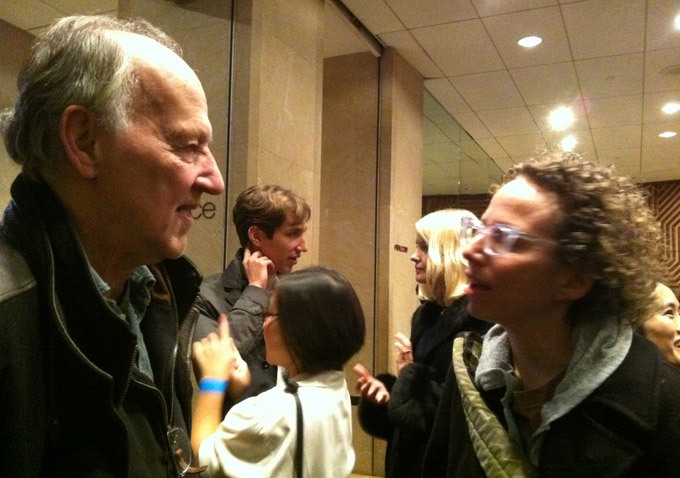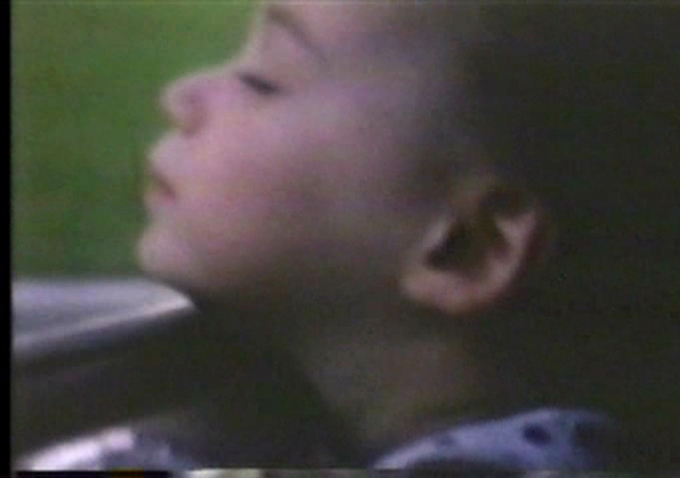PART 2: COMEDY IN WHICH MY KICKSTARTER CAMPAIGN INSPIRES ME TO SEEK AN ENDORSEMENT FROM WERNER HERZOG

So, speaking of filmmakers who combine first person speech with observations of the world, I was (and still am as I write this) deep into my Kickstarter campaign for Earth Camp one, and thought I’d go to the opening of DocNYC last Tuesday night not only to see the new Werner Herzog film Into the Abyss but to ask Herzog if he would endorse my film Earth Camp One’s Kickstarter campaign.
What, are you nuts? you’re asking. Well maybe in general, yes, but not in this case: when I was 22 I wrote Werner Herzog saying I wanted to make films and I wanted to work for him, and he answered my letter.
He wrote: so you want to be a filmmaker? Have you robbed a bank? Can you hold the attention of a group of 2 year olds? Have you climbed a mountain? A whole series of riddle-of-the Sphinx-like questions written out by hand on blue onionskin air mail paper. I wrote back (using a typewriter: this was two years before I got my first Mac Classic with a grant from the New York State Council on the Arts!), sending him some of my "street" photographs and telling him about the film idea that would eventually become Paris is Burning. He wrote back: I’m coming to New York, let’s have dinner! And we did! He took me to Hop Kee in Chinatown and told me to make my film, to steal a camera if need be. And we've crossed paths and gotten together a couple of times since.
I thought last Tuesday, he might, in the spirit of that dinner long ago, say something into my friend the filmmaker Hima B's camera, something I could post right here, like “give money to Jennie’s film now” or “I’m Werner Herzog and I endorse this Kickstarter campaign.”
So Hima and I go into the Skirball Center and the first person we see is Werner. I also see the crowd and realize this is a pretty big premiere. The wrong time to ask for anything. We say hello. Then everyone goes into the theater. Forget the endorsement, enjoy the film.
Well I did enjoy the film. The subject, death row in Texas, was compelling enough. There was an amazing interview with a retired executioner and a surprise ending having to do with smuggling some very unusual contraband OUT of a prison. It was, for Werner Herzog, an uncharacteristically emotional film. At the film’s center wa s father-son relationship, not something you see much of in Herzog!
At the reception afterwards, the Poland Springs was flowing and I was feeling very free. I thought, what the heck? I met Werner's daughter, a photographer who had a gracious and bemused air towards the people pressing in to talk to a man who'd earned cult status for 40 years and 60 films. I told Werner about this campaign and about Kickstarter, how and why crowd-sourcing works. He said, “I barely look at the Internet. I don’t even have a phone.” He said that raising money that way is asking for a handout and I shouldn’t do it. “Well, how should I raise the money to edit my film?” I asked? “You should be a bouncer in a sex club!” he told me. ( If you think I’m making this up to be colorful, go
here, 4 paragraphs down.)
Bouncer in a sex club? I flexed my muscles in a bouncerly way. FYI I’m 5’5” and 120 pounds. “Werner, you think they’d hire me?” He saw my point. “You should work in a brothel!” (I hoped he meant as a decorator or pornographer.) He advised “you should work out in the real world, earn money, and make your film for $10,000. You should be self-reliant!”
Now I don’t disagree that it’s honorable to earn money with the sweat of your brow and put that money back into your art. But the film we saw at DocNYC was funded by The Discovery Channel. No doubt Herzog was paid, the editor was paid, the producers were paid, the composer and the musicians were paid. The budget was not $10K.
Am I begrudging a filmmaker whose work I hugely admire the status he's earned? Certainly not. Look, there are a lot of ways to flex muscles. It’s like the difference between third and first person. By supporting my film my backers on Kickstarter are acknowledging we can’t depend only on corporations or on artists’ savings to get good culture made. And from my point of view, their pledging is a great reason to wake up in the morning and feel I’ve got a shot at finishing a film I’ve been working on, on and off, for 10 years. And I know that even if a veteran filmmaker like Werner Herzog hasn’t heard of Kickstarter yet, I choose to believe that, in the deeper recesses of his own heart, he would endorse any filmmaker who's doing what it takes to make a film. I might feel shameful for a filmmaker of Herzog’s generation to write everyone he knows and ask for $10 or $1000 to get in the editing room, and although I didn’t grow up on the Internet (I grew up on the telephone!) I’m glad I’m flexible enough to do what needs to be done to make a film, and if crowd-sourcing is one tool in the toolbag right now, I’m happy to use it. Plus, there’s something amazing about the people for whom you intend the film giving it props before it’s even done. It’s very satisfying. It’s radical and democratic and actually makes you realize that you are making your work for people. Actual people.
A final word on Herzog. Into the Abyss contains a remarkable portrait of a woman whose brother and mother were murdered. Then a few other family members died and she didn't leave the house for four years. Got rid of her phone, afraid of the news that could come with each ring. I told Werner that my film was about that kind of loss in my own life [though fortunately not that kind of depression] and he said “well make the film, but get it over with!” I completely agree.
As of writing this I have 2 days left in the Kickstarter campaign. It ends Friday night and 8 and I hope it works, so I don’t have to work as a bouncer in a sex club.
Jennie Livingston works in both fiction and nonfiction. Her films include Paris is Burning, Who's the Top? and Through the Ice. She lives in Brooklyn, NY. This summer she directed a video for Elton John's Las Vegas stage show, a series of portraits of New Yorkers to accompany the song "Mona Lisas and Mad Hatters."





